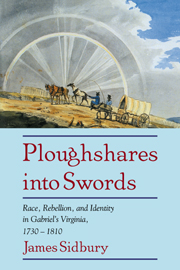Book contents
- Frontmatter
- Contents
- Acknowledgments
- Introduction
- Prologue: From Blacks in Virginia to Black Virginians
- 1 The emergence of racial consciousness in eighteenth-century Virginia
- Part I Cultural process: Creolization, appropriation, and collective identity in Gabriel's Virginia
- Part II Social practice: Urbanization, commercialization, and identity in the daily life of Gabriel's Richmond
- Epilogue: Gabriel and Richmond in historical and fictional time
- Appendix: Richmond households in 1784 and 1810
- Index
Part II - Social practice: Urbanization, commercialization, and identity in the daily life of Gabriel's Richmond
Published online by Cambridge University Press: 04 August 2010
- Frontmatter
- Contents
- Acknowledgments
- Introduction
- Prologue: From Blacks in Virginia to Black Virginians
- 1 The emergence of racial consciousness in eighteenth-century Virginia
- Part I Cultural process: Creolization, appropriation, and collective identity in Gabriel's Virginia
- Part II Social practice: Urbanization, commercialization, and identity in the daily life of Gabriel's Richmond
- Epilogue: Gabriel and Richmond in historical and fictional time
- Appendix: Richmond households in 1784 and 1810
- Index
Summary
The cultural processes through which Virginians of African descent expressed and created crosscutting senses of collective identity emerge with unusual clarity from an examination of Gabriel's Conspiracy, but the clarity is achieved at the cost of understanding the day-to-day practices that constituted the social world in which the conspiracy was built. Gabriel and his followers grew up in and around Richmond during and after the American Revolution, a period during which Virginia's General Assembly moved the state capital from Williamsburg to Richmond. Becoming the new state's capital turned the town into the political center of Virginia, and the rapid development of Richmond's hinterland helped to turn it into a commercial and manufacturing center. Black and White residents of this new urban area, most of whom had grown up in rural Virginia, adapted themselves to the urban conditions that they found and created. Richmond's density of settlement, the transience of the Black and White workers who carried goods into and out of town, the influence of free people of color who moved into town, and the recreational possibilities created by the city combined to produce patterns of interaction among people of different races and statuses that were qualitatively different from those that had prevailed on Virginia's plantations. Ascribed racial identity remained the most important determinant of individuals' lives, but relations among Black and White working people became less predictable and more flexible, a situation that offered new opportunities for Black Richmonders and that sometimes troubled elite Whites.
- Type
- Chapter
- Information
- Ploughshares into SwordsRace, Rebellion, and Identity in Gabriel's Virginia, 1730–1810, pp. 149 - 150Publisher: Cambridge University PressPrint publication year: 1997



